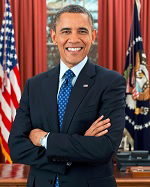It's not often that the president of the United States is asked to weigh in on whether an experimental drug should be OK'd for human use ahead of human trials. But when it comes to an outbreak of a lethal virus--even one that's been percolating in equatorial Africa for decades--everything is potential fodder for reporters operating in a 24-hour news cycle.
 |
| President Barack Obama |
So when Obama mildly remarked that "I don't think all the information is in on whether this drug is helpful," headlines were fired off that were heard around the world.
Obama was talking about an experimental therapy from Mapp Biopharmaceutical, a San Diego biotech so obscure that CNN took to referring to its therapy--using antibodies harvested from mice and "humanized" into a cocktail remedy--as a "secret serum." And an air of mystery quickly grew up around Mapp, especially as the handful of company execs involved steadfastly declined interviews with a mob of reporters.
Until the high-profile New York Times biotech scribe Andrew Pollack called.
"We definitely would like to ramp up to have an impact on the Ebola epidemic," Mapp co-founder Kevin Whaley told Pollack. But he added, "We're not decision makers on many of these issues. There are regulatory and legal issues that have to be addressed."
Some of those issues are going to be addressed directly by the World Health Organization in coming days as officials ponder the implications of providing an experimental therapy to Ebola patients even before it had run through primate tox tests. But with the death toll rising and two Americans appearing to be responding to the treatment, Mapp's therapy looks like another early winner in the viral sweepstakes that has played out--and paid out--repeatedly over the decades.
Mapp also isn't the only player in the game. Sarepta ($SRPT) made that clear yesterday as it highlighted a shelved Ebola drug program of its own. Pollack notes that Toronto-based Defyrus, another tiny company largely unheard of until now, was working on something similar. (Defyrus didn't waste the opportunity, either. It forged a licensing deal on its program and announced it yesterday.) And Reuters cites Profectus BioSciences alongside Tekmira ($TKMR), which had a program funded by Defense officials until safety worries forced a hold on their work.
With so much attention coming from every corner, it's a glorious opportunity for a biotech to leap out of the shadows and take a shot at near-term opportunities. History tends to show, though, that once the fear and headlines fade, so does interest in funding the long, hard R&D efforts ultimately required to prove a drug is safe and effective.
- here's the report from The Independent
- read the story from The New York Times
- here's the report from Reuters